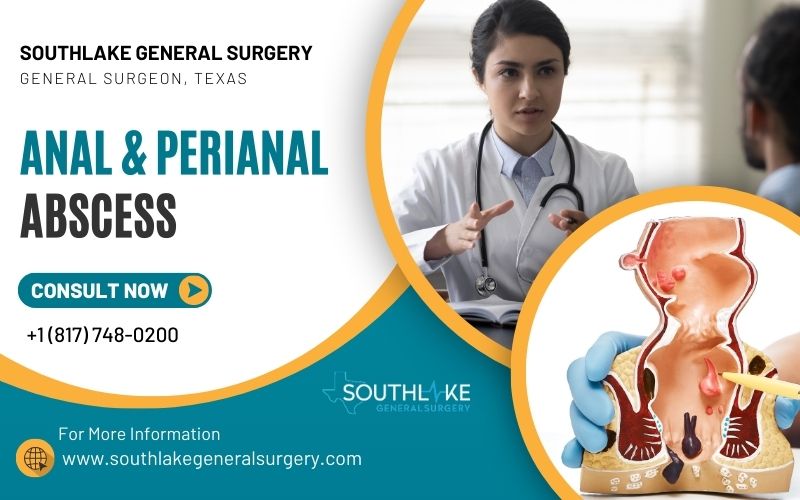An anal abscess is a condition in which pus forms near the anus and it is a painful condition. Many of them lead to infection from small anal glands.
Perianal abscess is the most well-known form of an abscess. At times, it develops as a painful lump that looks like swelling close to the anus. A perianal abscess may appear red in color and warm to the touch.
An anal abscess is situated in deeper tissue is more uncommon and might be less noticeable. Treatment for perianal abscess at Southlake general surgery, Texas, and all other types of anal abscesses are performed through surgical incision and drainage, and it is generally successful.
About half of patients with an anal abscess will build a complication known as a fistula. A fistula is a little passage that makes an unusual link between the location of the abscess and the skin.
At times, an anal fistula produces continual drainage. In many cases, where the outer part of the tunnel opening shuts, the outcome might be repetitive anal abscesses. Abscess surgery at Southlake general surgery, Texas is performed by senior general surgeon Dr. Valeria Simone MD and it is recommended to cure practically all anal fistulas.
What are the causes of Anal Abscesses?
There are multiple reasons that an anal abscess can form, which may include:
- Blockage of anal glands
- Sexually Transmitted Infections (STI)
- An anal fissure is a tear in the anal canal that gets diseased.
Risks of Anal Abscess
- Diverticulitis
- Colitis
- Pelvic inflammatory infection
- Diabetes
- Inflammatory bowel infection like ulcerative colitis or Crohn’s disease
- Use of medicines like prednisone
- Anal sex
Few precautions can help prevent anal abscesses such as the use of condoms by adults during sexual intercourse and anal sex. For children and infants, frequent change of diaper and adequate hygiene during change of diapers to prevent perianal abscesses and anal fistulas.
How to identify the symptoms of Anal Abscesses
Following are the symptoms of anal abscesses that an individual may encounter:
- Skin inflammation close to the anus includes redness, swelling, and warmth.
- Long-term constipation or anal pain related to bowel movements.
- Constant, throbbing, and severe pain while sitting.
- Discharge of pus.
Symptoms of deeper anal abscesses:
- Fever, malaise, or chills
At times, an individual may only experience fever as a symptom of a deep anal abscess.
How to diagnose Anal Abscesses?
Diagnosis of anal abscesses at Southlake General Surgery, Texas mainly requires a physical examination that includes a digital rectal examination which is helpful enough to identify an anal abscess. However, few patients may need some more tests to examine for:
- STI, Sexually Transmitted Infections
- Diverticular disease
- Rectal cancer
- Inflammatory bowel disease
In rare conditions, the doctor may use anesthesia for physical examination and may also prescribe for an ultrasound, an MRI, or a CT scan.
What is the Treatment of Anal Abscesses?
Treatment of anal abscess at Southlake General Surgery, Texas is performed by board-certified general surgeon Dr. Valeria Simone MD. In anal abscess treatment, a quick surgical incision and drainage are recommended, ideally before the abscess burst. A patient may need to hospitalize for large and deeper anal abscesses and needs an anesthesiologist.
After anal abscess surgery, many individuals have been prescribed pain relief medicines, and few don’t require antibiotics. Antibiotics may be needed by individuals with diabetes or low immunity.
At times, your doctor may perform abscess surgery and fistula surgery at the same time. But fistula often forms in about four to six weeks after an abscess is depleted. In few cases, a fistula may not happen until months or even a long time later. Therefore, fistula surgery is generally a separate surgical procedure to be performed on an outpatient premise or a shorter hospital stay can be organized by Southlake General Surgery, Texas.
The patient may experience mild discomfort after abscess or fistula surgery which is managed with pain medicines. Individuals are generally briefed with after surgery instructions like take a sitz bath (to soak the influenced region in warm water) three to four times a day, take stool softeners to facilitate uncomfortable bowel movements, few individuals may also prescribe to wear a gauze pad or mini pad to avoid the drainage from staining garments.
After abscess surgery complications can include:
- Anal Fissure
- Infection
- Scarring
- Recurring abscess
Once your anal fistula or anal abscess has appropriately healed, it’s improbable that the issue will return. To keep one from doing as such, it is always recommended to follow the doctor’s instructions.
To know more about Perianal abscess and anal abscess – causes, symptoms, diagnosis, treatment, and consultation. Please contact our healthcare expert today at +1 (817) 748-0200 or Click here to book an online appointment with us.
Follow us on Facebook.

